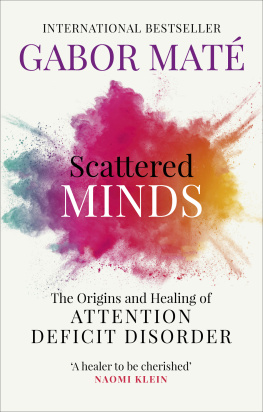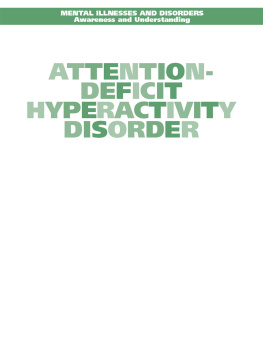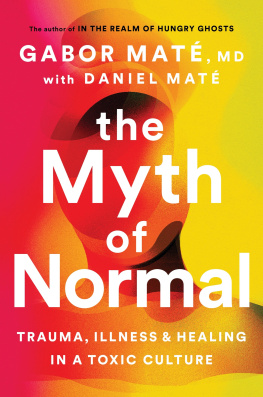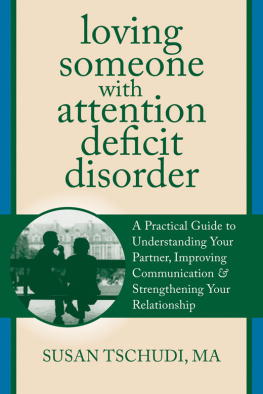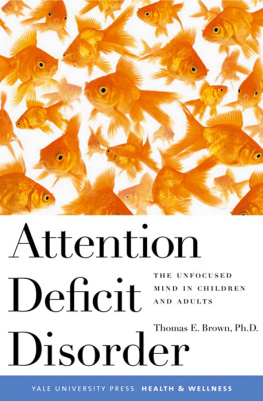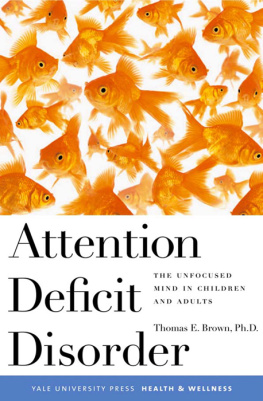Gabor Maté - Scattered Minds: The Origins and Healing of Attention Deficit Disorder
Here you can read online Gabor Maté - Scattered Minds: The Origins and Healing of Attention Deficit Disorder full text of the book (entire story) in english for free. Download pdf and epub, get meaning, cover and reviews about this ebook. year: 2019, publisher: Random House, genre: Home and family. Description of the work, (preface) as well as reviews are available. Best literature library LitArk.com created for fans of good reading and offers a wide selection of genres:
Romance novel
Science fiction
Adventure
Detective
Science
History
Home and family
Prose
Art
Politics
Computer
Non-fiction
Religion
Business
Children
Humor
Choose a favorite category and find really read worthwhile books. Enjoy immersion in the world of imagination, feel the emotions of the characters or learn something new for yourself, make an fascinating discovery.
- Book:Scattered Minds: The Origins and Healing of Attention Deficit Disorder
- Author:
- Publisher:Random House
- Genre:
- Year:2019
- Rating:5 / 5
- Favourites:Add to favourites
- Your mark:
- 100
- 1
- 2
- 3
- 4
- 5
Scattered Minds: The Origins and Healing of Attention Deficit Disorder: summary, description and annotation
We offer to read an annotation, description, summary or preface (depends on what the author of the book "Scattered Minds: The Origins and Healing of Attention Deficit Disorder" wrote himself). If you haven't found the necessary information about the book — write in the comments, we will try to find it.
Scattered Minds: The Origins and Healing of Attention Deficit Disorder — read online for free the complete book (whole text) full work
Below is the text of the book, divided by pages. System saving the place of the last page read, allows you to conveniently read the book "Scattered Minds: The Origins and Healing of Attention Deficit Disorder" online for free, without having to search again every time where you left off. Put a bookmark, and you can go to the page where you finished reading at any time.
Font size:
Interval:
Bookmark:

Scattered Minds explodes the myth of attention deficit disorder as genetically based and offers real hope and advice for children and adults who live with the condition.
Gabor Mat is a revered physician who specializes in neurology, psychiatry and psychology and himself has ADD . With wisdom gained through years of medical practice and research, Scattered Minds is a must-read for parents and for anyone interested how experiences in infancy shape the biology and psychology of the human brain.
Scattered Minds:
- Demonstrates that ADD is not an inherited illness, but a reversible impairment and developmental delay
- Explains that in ADD , circuits in the brain whose job is emotional self-regulation and attention control fail to develop in infancy and why
- Shows how distractibility is the psychological product of life experience
- Allows parents to understand what makes their ADD children tick, and adults with ADD to gain insights into their emotions and behaviours
- Expresses optimism about neurological development even in adulthood
- Presents a programme of how to promote this development in both children and adults
Gabor Mat is a retired physician who, after 20 years of family practice and palliative care experience, worked extensively with patients challenged by drug addiction and mental illness. The bestselling author of four books published in over twenty languages, Dr Mat is an internationally renowned speaker highly sought after for his expertise on addiction, trauma, childhood development, and the relationship of stress and illness. His book on addiction received the Hubert Evans Prize for literary non-fiction. For his groundbreaking medical work and writing he has been awarded the Order of Canada (his countrys equivalent of the MBE) and the Civic Merit Award from his hometown, Vancouver. His books include In the Realm of Hungry Ghosts: Close Encounters with Addiction; When the Body Says No: The Cost of Hidden Stress; Scattered Minds: The Origins and Healing of Attention Deficit Disorder and (with Gordon Neufeld) Hold on to Your Kids: Why Parents Need to Matter More Than Peers.
drgabormate.com / @drmate
PRAISE FOR SCATTERED MINDS
[Gabor Mat] challenges the standard view of ADD [and] asks questions that deserve to be considered about a debilitating disorderand the kind of society in which it flourishes.
Macleans
Enlightening and sensitively told [with] a much needed focus on adults and adolescents with ADHD . For some-one who is wondering if their own lack of attention, impulsiveness, distractibility, or hyperactivity may be ADHD , this would be a good read.
Winnipeg Free Press
Scattered Minds comes across as a caring, sympathetic, supportive, and helpful introduction to the topic. It also benefits from being an extremely well-written and engaging read.
The Georgia Straight
This book will be equally at home on the physicians bookshelf [and] in the home.
The County Chronicle
Scattered Minds [is] necessary reading for anyone who lives with the effects of ADD , in himself or in others; its an encouraging and reassuring approach.
The ChronicleJournal (Thunder Bay)
This delightful, helpful book is a welcome addition to the literature on ADD . Based on solid research and a strong humanistic sensibility, it is written with humour and com-passion, from an unsparingly honest personal perspective. I would enthusiastically recommend Scattered Minds to anyone touched by ADD adults, parents, and professionals.
Dr. John Ratey, co-author, Driven to Distraction and Shadow Syndromes

For my mother, Judith (Lvi) Mat, and for my late father, Andor Mat, and for my own family, Rae, Daniel, Aaron and Hannah
Scattered Minds is written in seven parts. The first four describe the nature of attention deficit disorder and offer an explanation of its origins, while the final three deal with the healing process. , on the ADD child, is intended not only for parents but also for adults with attention deficit disorder, as it gives information essential to their self-understanding. Similarly, parents who read the chapters concerning the ADD adult may gain further insights about their ADD children and, perhaps, also about themselves.
Attention deficit disorder is sometimes abbreviated to ADD , sometimes to ADHD . To further muddy the waters, the official designation is AD(H)D , meant to indicate the fact that one can have ADD with or without hyperactivity. By and large, ADD has become common usage. It is the least confusing form, and also the least awkward. It is the one employed exclusively in this book.
Action has meaning only in relationship and without understanding relationship, action on any level will only breed conflict. The understanding of relationship is infinitely more important than the search for any plan of action.
J. KRISHNAMURTI
Attention deficit disorder is usually explained as the result of bad genes by those who believe in it, and as the product of bad parenting by those who dont. The aura of confusion and even acrimony that surrounds public debate about the condition discourages a reasoned discussion of how environment and heredity might mutually affect the neurophysiology of children growing up in stressed families, in a fragmented and highly pressured society and in a culture that seems more and more frenzied.
I have attention deficit disorder myself, and my three children have also been diagnosed with ADD . I do not think it is a matter of bad genes or bad parenting, but I do believe it is a matter of genes and parenting. Neuroscience has established that the human brain is not programmed by biological heredity alone, that its circuits are shaped by what happens after the infant enters the world, and even while it is in the uterus. The emotional states of the parents and how they live their lives have a major impact on the formation of their childrens brains, though parents cannot often know or control such subtle unconscious influences. The good news is that major changes in the circuits of the brain can occur in the child and even in the adult if the conditions necessary for positive development are created.
Quick to arise whenever the environment is mentioned is the question of blame. You mean its the parents fault? people immediately ask. It is a simplistic notion that if something is wrong, someone has to be at fault. It would not help parents of children with ADD , besieged on all sides by the incomprehending judgments and criticality of friends, family, neighbors, teachers and even strangers in the street, to have yet one more finger pointed at them. This book does not do so.
A doctor in Ontario gave the father of a nine-year-old girl with attention deficit disorder a dramatically apt analogy. Imagine, he said, youre standing in the middle of a really crowded room. Everyone around you is talking. Suddenly someone asks, you, What did so-and-so just say? Thats what its like inside the ADD brain and how it is for your child. A parallel analogy suits the situation the parents of ADD children find themelves in: youre stuck in the middle of heavy traffic at an intersection; the engine has stalled and you are trying your best to get moving. Everyone is yelling and honking angrily at you, but no one offers to help. Perhaps no one knows how to.
Font size:
Interval:
Bookmark:
Similar books «Scattered Minds: The Origins and Healing of Attention Deficit Disorder»
Look at similar books to Scattered Minds: The Origins and Healing of Attention Deficit Disorder. We have selected literature similar in name and meaning in the hope of providing readers with more options to find new, interesting, not yet read works.
Discussion, reviews of the book Scattered Minds: The Origins and Healing of Attention Deficit Disorder and just readers' own opinions. Leave your comments, write what you think about the work, its meaning or the main characters. Specify what exactly you liked and what you didn't like, and why you think so.

